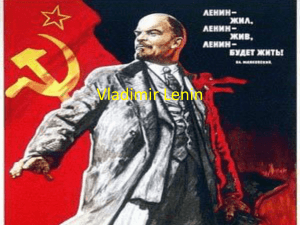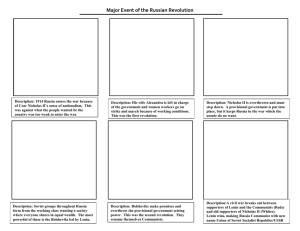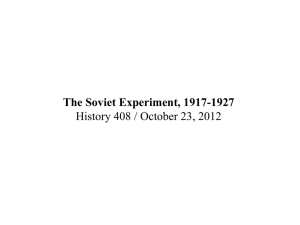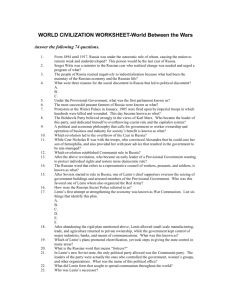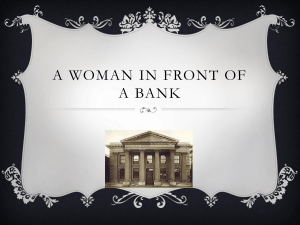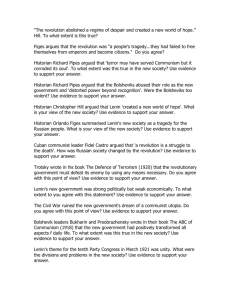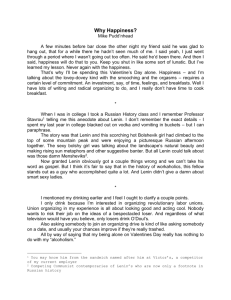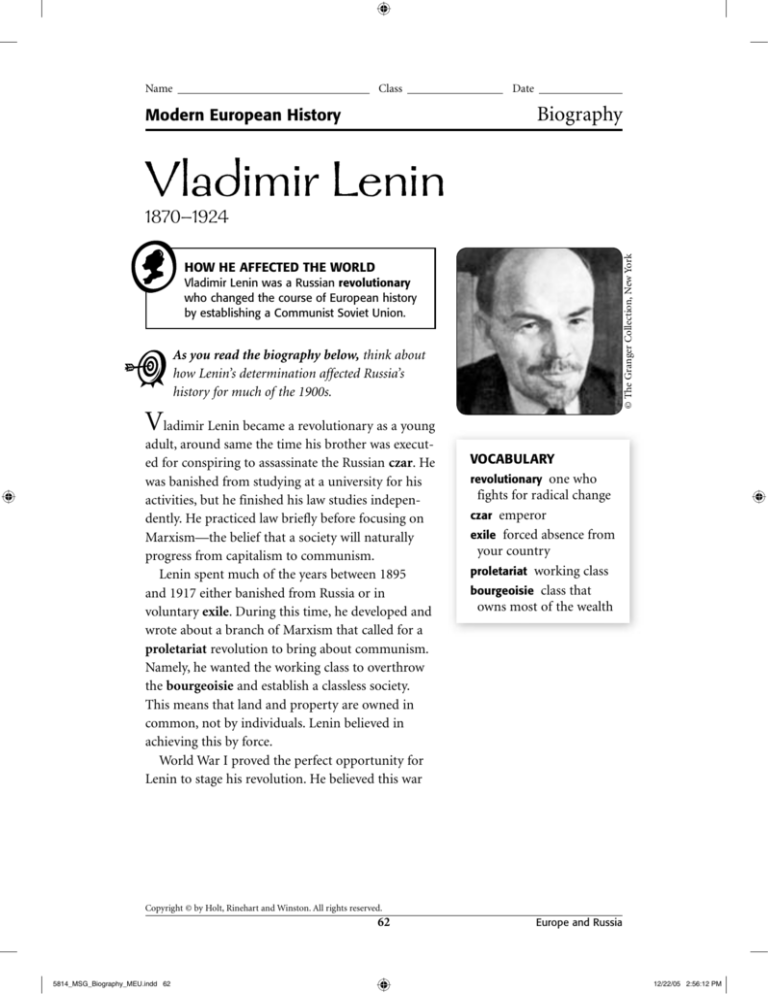
Name
Class
Date
Biography
Modern European History
Vladimir Lenin
© The Granger Collection, New York
1870–1924
HOW HE AFFECTED THE WORLD
Vladimir Lenin was a Russian revolutionary
who changed the course of European history
by establishing a Communist Soviet Union.
As you read the biography below, think about
how Lenin’s determination affected Russia’s
history for much of the 1900s.
Vladimir Lenin became a revolutionary as a young
adult, around same the time his brother was executed for conspiring to assassinate the Russian czar. He
was banished from studying at a university for his
activities, but he finished his law studies independently. He practiced law briefly before focusing on
Marxism—the belief that a society will naturally
progress from capitalism to communism.
Lenin spent much of the years between 1895
and 1917 either banished from Russia or in
voluntary exile. During this time, he developed and
wrote about a branch of Marxism that called for a
proletariat revolution to bring about communism.
Namely, he wanted the working class to overthrow
the bourgeoisie and establish a classless society.
This means that land and property are owned in
common, not by individuals. Lenin believed in
achieving this by force.
World War I proved the perfect opportunity for
Lenin to stage his revolution. He believed this war
VOCABULARY
revolutionary one who
fights for radical change
czar emperor
exile forced absence from
your country
proletariat working class
bourgeoisie class that
owns most of the wealth
Copyright © by Holt, Rinehart and Winston. All rights reserved.
62
5814_MSG_Biography_MEU.indd 62
Europe and Russia
12/22/05 2:56:12 PM
Name
Class
Date
Vladimir Lenin, continued
Biography
was caused by greed on both sides for land. After
three years at war, Russian peasants supported
Lenin’s plan for peace with Germany. The German
government supported Lenin’s plan as well.
In 1917 Lenin and his Bolshevik Party (his
brand of Marxism) took power. They established
a Soviet government with Lenin as their leader.
The government kept its promise of peace with
Germany by signing a treaty. They also ended
private ownership of land and distributed it among
the working class. Factory workers finally had
control over their production—in theory. Lenin
set up a Communist dictatorship and put down all
opposition.
After his death in 1924, his body was specially
preserved and placed on display in Moscow. It is
still on display.
WHAT DID YOU LEARN?
1. Identify What were some of the major components of Lenin’s political beliefs?
2. Evaluate Do you think Lenin was a popular leader in his country? Give reasons
for your answer.
ACTIVITY
Suppose that it is October 1917, and you are Vladimir Lenin. You are
about to give your first speech as the new, victorious leader of Russia.
What will you say to the men and women of your country? Write your
speech on a separate piece of paper.
Copyright © by Holt, Rinehart and Winston. All rights reserved.
63
5814_MSG_Biography_MEU.indd 63
Europe and Russia
12/22/05 2:56:52 PM
Answer Key
Modern European History
Vocabulary Builder
Biography
SECTION 1
ANNE FRANK
possible answers:
1. Nationalism created growing tensions
between European countries and caused
WWI.
2. The Allies, which consisted of Serbia,
Britain, France, Russia, and later the
United States, fought against the Central
Powers, led by Austria-Hungary and
Germany.
3. Trench warfare created a stalemate in the
war and exposed the soldiers to constant
danger, cold, hunger, and disease.
4. The Treaty of Versailles demanded that
Germany accept blame for the war, slash
the size of its army, give up overseas
colonies, and pay billions of dollars for
damage.
5. Some countries were governed by
communism
An alliance is a group of nations that have
joined together to advance and defend its
goals.
WHAT DID YOU LEARN?
1. possible answer—Anne Frank and her
family went into hiding in an attic to
escape persecution by the Nazis. They were
discovered in 1944. Anne, her mother, and
sister all died in the Holocaust. Anne’s
diary was published after her death.
2. Answers will vary. Some students may
note her detailed description of life in
hiding. Other students may mention
her optimism despite her situation.
ACTIVITY
Epitaphs may reflect Anne’s optimism,
hopefulness, talkativeness, or bravery.
Biography
VLADIMIR LENIN
WHAT DID YOU LEARN?
1. classless society, no individual ownership
of land and property
2. Students may focus on the proletariat
point of view (Lenin would be popular)
or on the upper class point of view
(probably not popular).
SECTION 2
1.
2.
3.
4.
5.
6.
F; Axis Powers
T
F; dictator
T
T
F; Allies
Definitions may vary but should be
appropriate for each term selected.
ACTIVITY
Speeches will vary, but should focus on Lenin’s
belief that power will be given back to the
workers (proletariat) and that there will no
longer be such differences in lifestyle between
the wealthy and the poor.
SECTION 3
1.
2.
3.
4.
5.
Cold War
reunification
ethnic tensions
European Union
arms race
possible answer—During the Cold War, the
two superpowers competed in an arms race.
Ethnic tensions transformed Eastern Europe.
To promote a common market, many nations
joined the European Union (EU).
Literature
CALL-OUT BOX
1. possible answer—Pigs and dogs are bigger
and hungrier than other animals.
2. because reduction is a more negative word
3. “harsh and bare,” “often hungry and often
cold,” “usually working”
Copyright © by Holt, Rinehart and Winston. All rights reserved.
233
5814_MSG_AnswerKey_MEU.indd 233
Europe and Russia
12/22/05 3:14:38 PM


